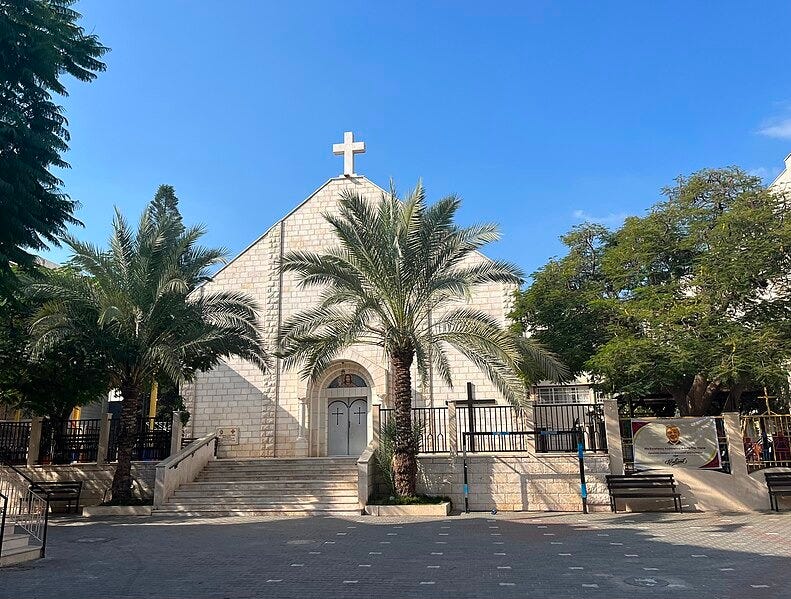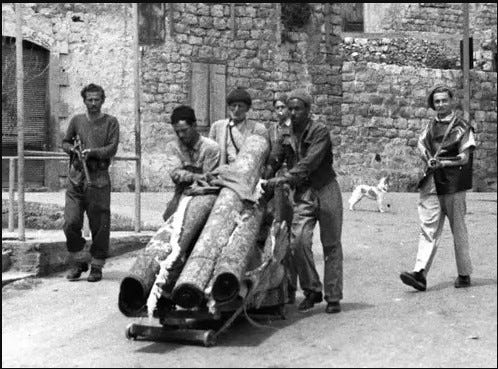The Stones Cry Out is a powerful and deeply moving documentary that offers a glimpse into the often-overlooked story of Palestinian Christians. Directed by Yasmine Perni, this 56-minute film offers an urgent message about the disappearing Palestinian Christian community in the Holy Land. Through archival footage, intimate interviews, and personal reflections, the film paints a tragic yet compelling picture of how this community has been systematically marginalized, overshadowed by the broader political conflict and the occupation that has affected all Palestinians.
A Community on the Brink of Disappearing
The film introduces Father Elias Chacour, a figure whose life parallels the fate of the Palestinian Christian community. Once a humble Melkite priest in Galilee, Chacour now serves as the Melkite patriarch of the Holy Land. His story is emblematic of the broader struggle: the fate of the Palestinian Christian community is tied to the land they’ve inhabited for centuries, but they are fast becoming a minority, with their numbers dwindling year by year.
This sense of loss is pervasive throughout the documentary. Through interviews with religious leaders, families, and ordinary citizens, The Stones Cry Out documents the growing fear that this community may soon cease to exist as a significant presence in the region. The film powerfully captures the tension between maintaining a Christian identity in a predominantly Muslim region while contending with the broader political and social pressures of the Israeli occupation. The fate of Palestinian Christians is intrinsically linked to the broader Palestinian struggle for self-determination and justice. In this context, Palestinian Christians have played a crucial role in the Palestinian cause, advocating for their rights and the protection of their heritage despite being caught in the crossfire of political and religious conflict.
The Zionist Narrative and the Palestinian Reality
The documentary also brings to the forefront the stark contrast between the Zionist narrative and the Palestinian narrative. While the Zionist narrative has often been told through the lens of heroism and the creation of the state of Israel, The Stones Cry Out calls attention to the Palestinian narrative as one of tragedy, displacement, and ongoing marginalization. Through interviews and historical context, the film challenges viewers to confront the reality that the Palestinian Christian community is not just a victim of occupation but also a people erased from the political narrative, ignored by the international community, and caught between two sides of an increasingly polarized conflict.
One of the most moving moments in the film touches on the role of the U.N. vote in 1947 that partitioned Palestine. The vote lasted just three minutes, with the land being given away while many Palestinians were sleeping. The film captures the emotions surrounding this moment and reminds viewers that the Palestinian people—Muslim and Christian alike—were not part of the decision-making process that determined the fate of their homeland.
Marginalization and Erasure: A Current Reality
A particularly striking element of the film is its examination of the current erasure of Palestinian Christians from both political and religious narratives. A recent real-world example highlights this: the tragic deaths of Nahida and Samar Anton, two Palestinian Christian women who were killed by a sniper in Gaza. When confronted with their deaths, Fleur Hassan-Nahoum, the Deputy Mayor of Jerusalem, refused to acknowledge the existence of Churchs and Christians in Gaza. This incident is a stark reminder of how Palestinian Christians continue to be excluded from the broader political conversation, and how their existence is denied by those in power.
The film’s technical execution amplifies this ongoing struggle. Through a combination of personal testimonies and archival footage, Perni paints a vivid picture of the hardships faced by Palestinian Christians. The cinematography contrasts the beauty of the Holy Land with the harsh realities of occupation and displacement, drawing attention to the tension between the land’s historical significance and the modern-day plight of its inhabitants.
A Call for Awareness and Change
Ultimately, The Stones Cry Out is not just a documentary; it is a call to action. The film challenges viewers to acknowledge the reality of Palestinian Christian lives in the context of the broader Palestinian struggle. It is a reminder that this community, despite centuries of occupation and adversity, continues to resist erasure, holding onto their faith, their identity, and their land. The film urges us to listen to the voices of those who have been silenced for too long, to reflect on the complexities of identity, faith, and resistance in a land marked by division and conflict.
In conclusion, The Stones Cry Out is an essential film for anyone seeking to understand the Palestinian experience, particularly the role of Palestinian Christians in this narrative. Through personal stories, historical context, and a compelling visual style, the film gives voice to a community on the brink of disappearance, urging us to confront the truth of their struggles and reconsider long-held assumptions. This documentary should serve as a wake-up call—especially for those Christians who have long supported Zionism without question—to acknowledge its impact on one of the world's oldest Christian communities. As these 'living stones' face systematic erasure, can we afford to look away?
All articles on Diaspora Dialogue are free to read for one year from publication. If you’ve enjoyed this piece and would like to support my work, you can do so by subscribing, or by buying me a coffee. Thank you for reading and being part of the dialogue!







